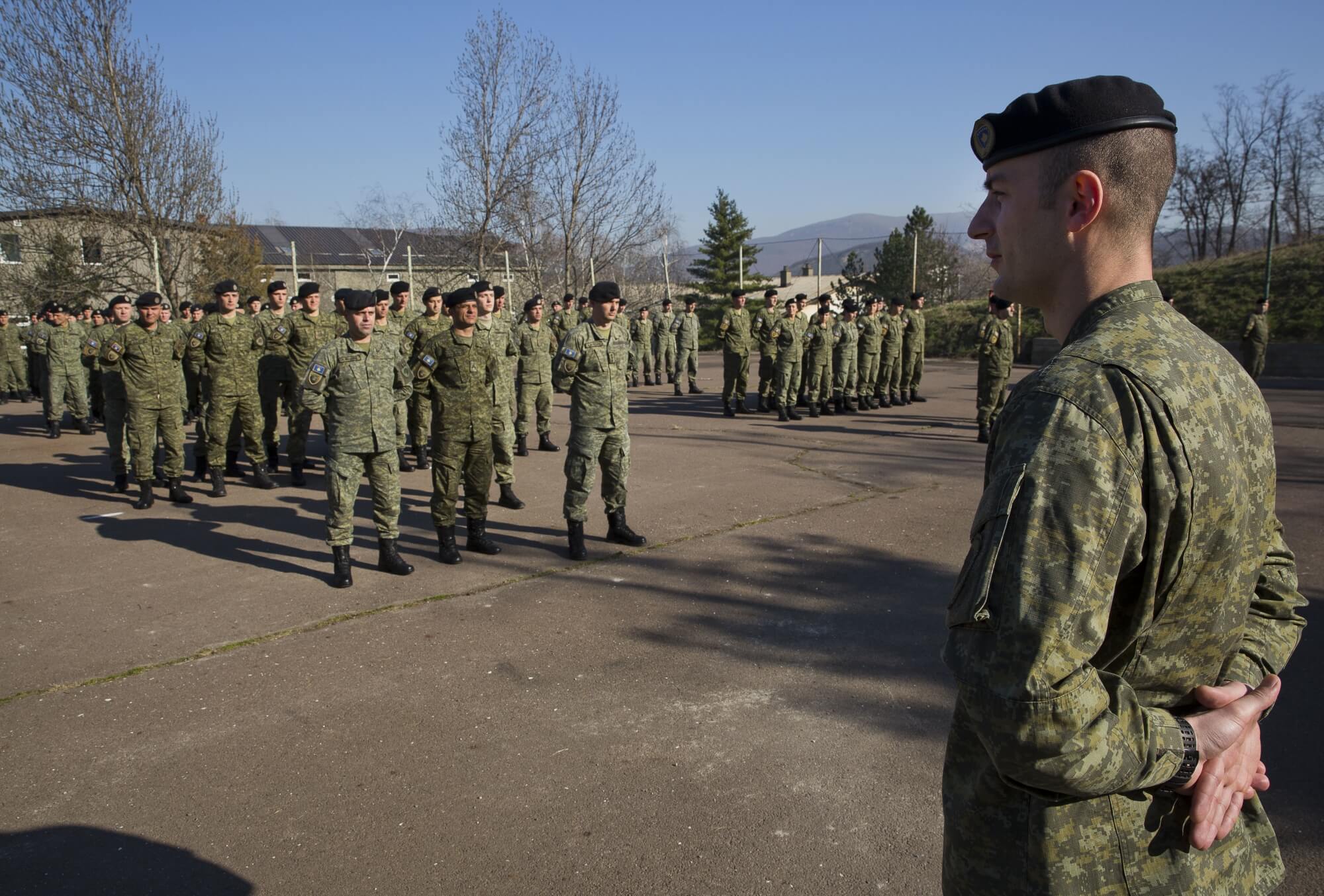Photo copyright Associated Press
With every day passing it seems more likely that Kosovo’s parliament will on the 14 December vote „yes” for three laws that will trigger transformation of Kosovo Security Force into an army. Why is this happening now? We have to understand that in Pristina this is a year worth forgetting: political instability (numerous incidents in Parliament); pause, and some would say collapse, of dialogue with Belgrade; the relative success of Belgrade in attempts to stop and reverse the „wave of recognition” (this year nine countries ,,revoked recognition” of Kosovo- term is in quotes because it remains controversial in international relations); „hard defeat” after attempts to become the member of Interpol (where the number of countries that supported prospect of membership is smaller than number of countries which recognised Kosovo) and finally, probably the biggest failure, the statement from Commissioner Hahn which stated that visa liberalisation is not gonna happen until the end of 2020 (there are colleagues who find responsibility of Serbia in this, but its naïve to think that Serbia holds the keys of visa liberalisation for Kosovo: according to recent information 12 countries were against it and out of neighbouring countries only Hungary and Bulgaria voted yes).
In the same time, despite the calls to shorten the mandate of UNMIK, opposition of Russia and China in Security Council makes that unlikely. Finally, in the last couple of months – with much bitterness, resistance and opposition – in the background there was a development of the narrative that borders need to be corrected in order for ,,historical agreement” between Kosovo and Serbia to be achieved. Two political leaders, Tachi and Haradinai, are competing for the voters support and currently, the latter is winning. Prishtina and Kosovo urgently need a „sucess” in order for the state-building process, a paradigm in which this society operated for almost 20 years, not be put in jeopardy.
In Kosovo, according to the barometer of Kosovo Center for Security Studies (KCSS), KSF represents the institution in which most citizens of ethnic Albanian descent trust (around 84%); while within Serbian communities the reverse is happening (only 4,7%). The international community (NATO, USA) invested large amounts of time and resources in KSF, insisting on multiethnic composition as one of the core principles; in part because of integration and feeling of belonging which was inspired by the success of armed forces in BiH. Distrust and suspicions that Serbian communities have been (obviously without any success- partly because of conflicting narratives coming from Belgrade) met with reassurance from Belgrade with an idea that the transformation won’t happen suddenly and that at least 10 years will pass until the army will have full „operational capability”.
What are the arguments for transformation? According to Florian Qehaja, Director of KCSS, first one is that KFOR will not stay forever on Kosovo and that one should prepare for that transitional period. The second one is that it is necessary to reach „local ownership”, which means that the time came for the citizens of Kosovo to make the change from being passive users of security to become active contributors. This should be done in an inclusive way, with the participation of all communities and in full cooperation with key Kosovo’s partners- USA, Great Britain and Germany (which by the way is against of transformation happening outside of constitutional framework). Qehaja, as his numerous colleges, asserts that it is not planned for the future army to have an offensive military capacity, which means heavy weaponry, and that its main goal will be (self)defence, assisting in states of emergency and presence in peace keeping operations. On the other side, in arguments against we should make a differentiation between ones of Belgrade officials and ones from Serbian representatives in Kosovo. Official Belgrade asserts that Resolution 1244 (which) states that outside of KFOR no army or armed force cannot exist. They also point out to the possible destabilisation and consequences on dialogue and ethnic relations. On the other hand, representatives from Serbian communities state that the main problem is distrust; they question the necessity of an army when KFOR is still present and remind that there is no possibility that Serbian armed forces will try to enter Kosovo without prior approval from NATO
Distrust contributes to building the perception of militarisation, even if we look at real intentions. Here, although that may be hard sometimes, we should understand Pristina. Serbia is an internationally recognised actor which develops (more or less) freely its armed forces investing in capacities and people and entering in relations it views as purposeful. As well as in the region, in Kosovo there is a strong and critical view of helicopters acquisitions, regular military exercises, project „1500” and to some extent the awareness that Serbian army has a possibility of developing an active reserve. That’s why on „our” side of the administrative line every show of Pristina strength (mainly entering of ROSU in the north of Kosovo) is perceived as an announcement of ambition for the establishment of complete and indisputable control over the whole territory of Kosovo.
That’s why one of the priorities in Belgrade’s agenda is to make the process of KSF transformation as hard as possible. According to KCSS analysis from September of 2018. pressure which Serbia allegedly put on Serbian members of KSF to leave the unit, are reminiscent of psychological-propaganda operation (psyop): besides the usual rhetoric (which declared them as traitors), it was suggested to them that in some future conflict they can find themselves on the side of the enemy, fighting against their brothers, they were warned that members of their close and extended family depend on incomes (salaries, pensions) from Serbia, they were threatened with prohibition of crossing the administrative line. Presumably, the biggest pressure was put on members of the unit in Gnjilane where, again according to reports of colleagues from Pristina, some success was accomplished in the integration of Serbian members. These accusations, which were openly expressed by members of the Kosovo government, are univocally denied by official Belgrade. What remains is the fact that at the beginning of 2018. KSF had around 130 Serbs, and that six months later 60 of them resigned. This has put in danger on of the most proclaimed goals of KSF that 10% of its force should be comprised of other ethnic groups living in Kosovo.
The question is whether Belgrade can act differently. We already characterised that the ,,game” (or the battle – depending from which side you look at it) which is lasting for more than ten years – recognition and disputing the sovereignty – must keep on going because otherwise, all current politics loses its substance. Besides, both sides are counting with an assumption that they can’t back down with pressure, because if partners in international community see that „they don’t care anymore” then they won’t advocate that hard for a given goal. In the moments of harsher rhetoric its more clear than ever how much damage is created because Belgrade and Pristina at no point in time honestly put effort into building a different relations which would enable real life to have a priority, instead of the abstract notion of a „state”- maybe then we would understand better each other, and in understanding needs of other side lies the root of future compromise.
First published in Novi magazin No. 399, 13 December 2018; translated to English by Marta Vasić, BFPE intern













